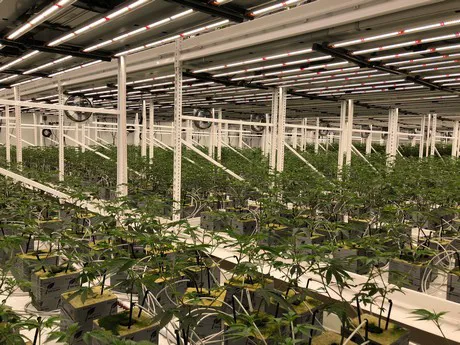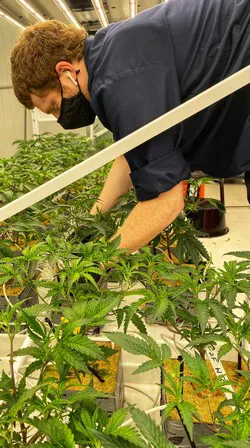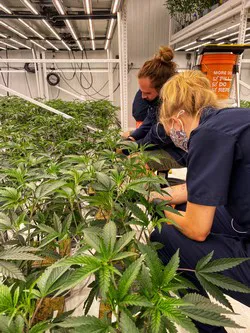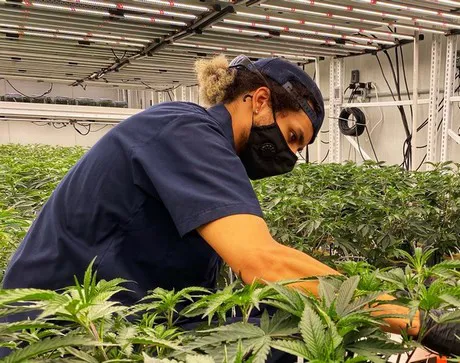Sozo is a medical cannabis provider based in the state of Michigan, serving patients in the city of Warren. “Despite the global pandemic, we have been doing very well, which is an indication that things are going well for the industry,” Joshua Ginsberg, director of cultivation with the company, explains. At the same time, Sozo has been able to perform well because of the forward-thinking attitude that has characterized the company since its inception. “It is of the utmost importance to move away from old practices rooted in an ‘illicit market mentality',” he says. “A lot of things one has done in a small-scale setting do not translate into a facility. As new information becomes available, and as the industry grows and the science becomes more prevalent, growers should adapt and implement. Changes with regards to that are usually for the better: technology is the right practice.”

Large-scale cannabis growing
Many are the differences between growing cannabis in a basement, so to say, and growing it in a large-scale, highly technological facility. “For instance, you have to manage from 30 up to 100 employees and have to make them understand that this is not a 9-5 industry: plants sometimes need more care, other times they need a bit less. It is important to have some flexibility with the worker schedule. Because of this uncertainty, we compensate with our wages that are very competitive, which come also together with a robust benefits package. Our success depends on our employees, and we do value them for their effort and commitment.”

The bigger the better, but more challenging
On top of the managerial tasks that a large-scale cannabis operation requires, there is a wide array of challenges that come with size. “There are a lot of challenges when it comes to growing indoors,” Joshua remarks. “Have you got the facility clean after the construction? How do you schedule the plant appropriately, considering that there might be some issues coming from using new equipment and new rooms. Speaking of that, it is crucial to plan for everything, either good or bad outcomes; but mainly, you have to be sure to be gathering data and info from new methods and equipment.”
In order to provide medical patients with safe medicines it is crucial to keep the growing environment clean. “In many facilities, this is one of the most difficult things to do,” Josh says. “Not only doing an industrial cleaning room to room is extremely necessary, but also and especially to keep said level of cleanliness. For instance, every time we finish a cycle, or even when the room still needs to start a very first cycle, we are spending the right time to make sure that the cleaning is done in a quick manner and it is up to our standard. With regards to this, it is important to do trial and error with new rooms to better understand which part is going to be dirtier or cleaner: understand the layout and figure out all the intricacies of the environment.”

Thanks to the utter care that Josh and his cultivation team put into the growing of the company’s medical cannabis, the feedback from the retail side has been fantastic. “We have carried out three cycles thus far,” he points out. “We are very confident in what we have got going here: the test results showed the full spectrum of cannabinoids in our products, not only THC, but other cannabinoids and terpenes too: this is ultimately the driving force for the medical field, as in what kind of cannabinoids and terpenes can we provide? As of now, our genetics are focused on THC, but they have different profiles and they carry different cannabinoids. The more diversity you can get in the product, the better it is for the market.”
Operating during a global pandemic
Since cannabis businesses have been deemed essential as lockdown measures got implemented, Sozo has never stopped production and kept supplying to its medical patients. “We could and still do rely on a state that has had our back and has been very proactive in handling the situation,” Josh says. “It is nice to have their support and directions during a time in which we all need it the most. At the same time, we take the situation very seriously nonetheless, and we keep increasing our checkpoints, signs for keeping masks and social distancing, and all of that. The whole situation has surely impacted us, but we didn’t stop and we even brought more staff on board to clean and to continue to expand: since we had more people, we had to break our shifts. Ultimately, things didn’t go as quickly as we wanted, but we have been able to take it step by step, maintaining our safety, and without reducing the salary to our employees, while at the same time we kept providing jobs to the community.”

Thanks to the beneficial impact that companies like Sozo have on their communities, and the newly acquired status of essential businesses, Josh expects more states and municipalities to go legal. “As the movement keeps increasing, people are also going to be more educated with regards to the products. Just like it happened with alcohol: the better the product and the consumer knowledge, the better the regulation.” Kristi Kelly, Sozo CSO, thinks the same, especially with regards to the public perception of the industry. “I believe that the politics and people have changed their perspective on cannabis,” she observes. “This is a new industry with forward-looking people, not only from the production side, but also from the consumer side. In the near future, the whole political landscape will ultimately reflect more this general sentiment.”
For more information:
Sozo
sozolife.com
